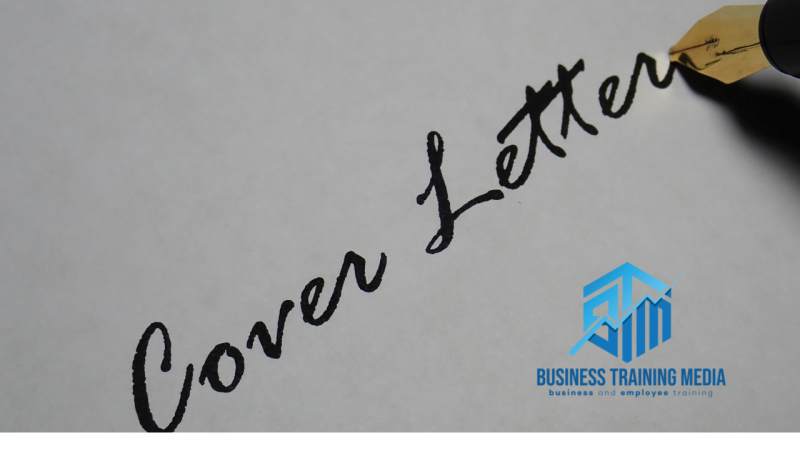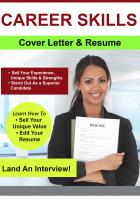
How to Write an Effective Cover Letter
By Business Training Media Publishing
A cover letter is a crucial component of a job application that provides an opportunity for a candidate to introduce themselves, showcase their skills and qualifications, and demonstrate their interest in the position they are applying for.
Writing an effective cover letter requires careful thought and attention to detail to stand out from the competition and make a great first impression. In this article, we will discuss the essential components of a cover letter and provide tips on how to write an effective one.
#1. Address the letter to the right person
When addressing your cover letter, it's essential to address it to the right person. If the job posting includes a specific contact person, use their name and title in your salutation. If the posting does not include a specific contact person, try to find out who the hiring manager is by doing some research. Look on the company's website or LinkedIn page to see if you can find the name of the hiring manager or the person who oversees the department you're applying for. If you're still unsure, consider calling the company directly and asking who the appropriate person is to address your cover letter to.
#2. Open with a strong introduction
The opening paragraph of your cover letter is your chance to grab the reader's attention and introduce yourself. Start with a strong opening sentence that hooks the reader and gets them interested in reading more. Then, briefly introduce yourself and state the position you're applying for. This paragraph should also include a sentence or two about why you're interested in the position and how you heard about it.
#3. Customize your letter to the job
The body of your cover letter should provide specific examples of your skills and experience that make you a strong candidate for the job. Use concrete examples to demonstrate your abilities and provide evidence of how you've used those skills in past jobs or projects. Don't just list your qualifications - show how those qualifications make you a good fit for the job.
#4. Highlight your relevant skills and experience
Employers want to hire candidates who are not only qualified for the job but also passionate about the work they'll be doing. Use your cover letter to demonstrate your enthusiasm for the job and the company. Show that you've done your research on the company by mentioning specific projects or initiatives that you find interesting. Explain why you're excited about the opportunity to work for this company and how it aligns with your career goals.
#5. Demonstrate your enthusiasm and passion
The closing paragraph of your cover letter is your chance to make a final impression and motivate the employer to take action. Restate your interest in the job and thank the employer for considering your application. Then, provide your contact information, including your phone number and email address, and invite the employer to contact you to schedule an interview. End with a strong call to action, such as "I look forward to hearing from you soon" or "Thank you for your time and consideration."
#6. Close with a strong call to action
The closing paragraph of your cover letter should include a strong call to action that motivates the employer to take action. Restate your interest in the job and invite the employer to contact you to schedule an interview. Provide your contact information, including your phone number and email address, and thank the employer for considering your application.
#7. Proofread your letter for errors
Before sending your cover letter, proofread it carefully to ensure that there are no spelling or grammar errors. Typos and mistakes can create a negative impression and make you look unprofessional. Use a spellchecker to catch any obvious errors, but also read through the letter carefully to catch any mistakes that might slip through. Consider asking a friend or family member to read your letter as well to provide feedback and catch any errors you might have missed.
Why the First Paragraph in Your Cover Letter is the Most Important
The first paragraph of your cover letter is one of the most important parts of the document. It's your chance to make a strong first impression and introduce yourself to the reader. Here are some tips for writing a strong opening paragraph:
- Use a hook to grab the reader's attention. Start with an attention-grabbing sentence that makes the reader want to keep reading. This could be a surprising statistic, a compelling anecdote, or a bold statement about your qualifications.
- Introduce yourself and state the position you're applying for. Be clear and concise in your introduction, and make sure the reader knows exactly who you are and what position you're interested in.
- Explain why you're interested in the position. This is your chance to show the reader that you've done your homework and that you're genuinely excited about the opportunity to work for their company.
- Highlight a few key qualifications. Use this paragraph to showcase some of your most relevant skills and qualifications that make you a strong candidate for the job. Be specific and provide examples that demonstrate your abilities.
Here's an example of an opening paragraph that incorporates these tips:
"Dear [Hiring Manager],
As a seasoned marketing professional with over 10 years of experience, I was thrilled to come across your job posting for a Senior Marketing Manager at [Company Name]. Your company's reputation for innovative marketing strategies and commitment to excellence aligns perfectly with my own professional goals, and I'm excited about the opportunity to apply my skills and experience to this role. With a proven track record of developing and executing successful marketing campaigns and a deep understanding of the industry, I'm confident that I have the skills and qualifications to excel in this position."
Remember, your opening paragraph should be attention-grabbing and informative, but also concise and to the point. Use this opportunity to make a strong first impression and set the tone for the rest of your cover letter.
In conclusion, an effective cover letter is an essential part of any job application. By following these tips, you can write a letter that showcases your skills and qualifications, demonstrates your enthusiasm for the job, and makes a great first impression.
Tailor your letter to the job, highlight your relevant skills and experience, and proofread it carefully to avoid any errors. With these strategies, you'll be well on your way to landing your dream job.
Copyright 2023: Business Training Media
Professional Written Resumes and Cover Letters
Join Our Free HR Training Solutions eNewletter
Join our free HR Training Solutions eNewsletter today to stay up-to-date on the latest industry trends, training and development programs, best practices, and expert insights. Gain valuable knowledge, enhance your skills, improve your organization, build productive teams and elevate your career. Don't miss out on this invaluable resource – sign up now for our free HR Training Solutions eNewsletter!

Create a Great Cover Letter and Resume
Get that job! A cover letter can help a job-seeker stand out from the other applicants. In this program you’ll learn the components of a great resume, the importance of editing documents and producing a great cover letter.




